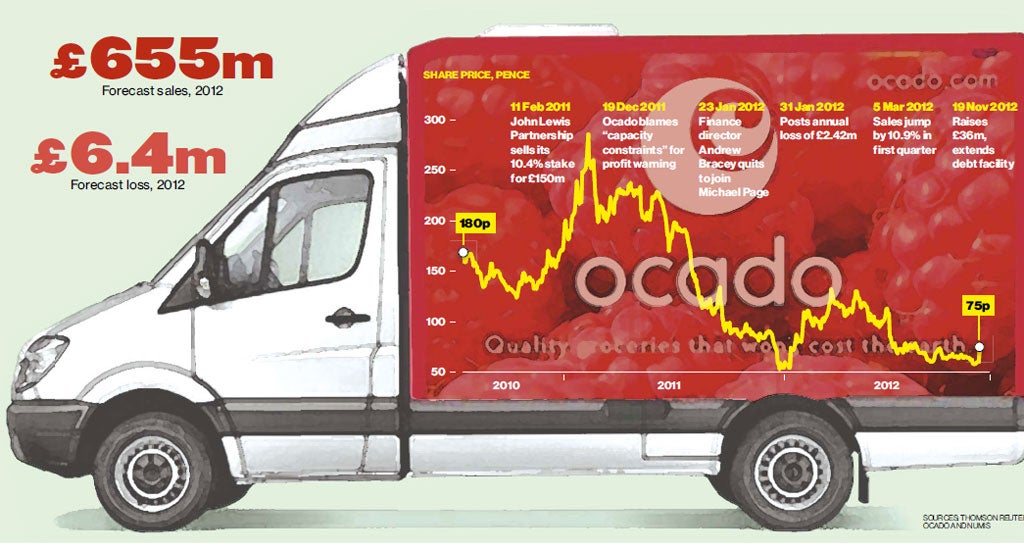Ocado must start delivering the goods
Shares in the loss-making online grocer soar as banks extend debt deadline, but there are still concerns over its business model, says James Thompson

Since it floated in July 2010, Ocado has not had too many days for celebration, despite continuing to deliver double-digit sales growth. In theory, yesterday should probably have been a day for high-fives as the online grocer's banks extended its debt facility by 18 months to 2015 and the company unveiled a £36m fund-raising.
Following months of speculation that Ocado could breach its loan terms, Tim Steiner, its chief executive, described the share placing and the extension to its debt maturity as "a strong endorsement from both its institutional and other shareholders and its lenders who support our confidence in our business model and growth prospects".
A surge of 14.5p, or 24 per cent, to 75p in its shares seemed another reason to crack open the bubbly at Ocado's high-tech distribution centre in Hertfordshire.
But it remains a country mile from its 180p flotation price and is still loss-making.
It's fair to say there are plenty of sceptics about the business model. They argue that Ocado, which delivers Waitrose and own-label groceries, is losing market share to rivals, such as Sainsbury's. They also contend that as Waitrose continues to grow its online grocery operation and stores estate rapidly, consumers will migrate to its own service.
Mr Steiner, one of three former Goldman Sachs bankers who founded the company in 2000, has always maintained that when Ocado and Waitrose vans operate in the same area, they both benefit from increased awareness of the brands.
Indeed, he said yesterday, it is between "five and 10 times" easier to acquire shoppers from the likes of Sainsbury's and Tesco, who are familiar with buying groceries on the internet, than it is to convert the unconverted.
That said, Tesco has a near-50 per cent share of the online grocery market, compared with Ocado's 14 per cent. Despite this, the market is growing rapidly. Online grocery spend is forecast by the trade body IGD to rise to 6 per cent of the total grocery market by 2016, up from 3.8 per cent last year.
However, the profitability issue continues to dog Ocado. While the online grocery has made a profit in isolated quarters, Numis forecasts a loss of £6.4m for the financial year just ended. With its Hatfield site running close to full capacity, the internet company is building a second distribution facility in Dordon, Warwickshire, at a cost of £210m. This is to deliver increased capacity and efficiencies, which will come through on its profit margins, as sales volumes grow massively.
But Clive Black, an analyst at Shore Capital, says: "Ocado is a business that delivers a good service for customers but not for shareholders. It has spent a huge amount of money on its existing distribution centre and the second site in Warwickshire is not short of money either at £210m. This is a gargantuan amount for a distribution centre."
Certainly, Ocado has already burned through hundreds of millions of pounds over the last decade, such as on IT systems, warehouse machinery, marketing and its huge fleet of delivery vans. In fact, its dedicated warehouse model – based on Hatfield as the hub with a handful warehouse spokes around the country – is radically different to the largely pick-in-store model used by Sainsbury's, Asda and Tesco. This means that supermarket giant's staff are able to fulfil online orders in store, which their vans deliver to houses in the local vicinity.
While Ocado argues it does not suffer the supermarkets' cost of staff putting items on shelves and food wastage, it incurs huge costs associated with its vans, including drivers, petrol and vehicle service charges, in delivering to consumers – often over much longer distances. That said, no doubt yesterday was a positive day for Ocado, after its lenders, Barclays, HSBC Lloyds, agreed to extend the deadline of its £100m capital expenditure facility by a further 18 months to July 2015.
The online grocer also plans to raise £35.8m through a placing of 56 million shares – 10 per cent of its equity – with certain existing shareholders, including board members, and will invest it in expanding its ranges, particularly non-food items, improving customer service and marketing.
Duncan Tatton-Brown, Ocado's finance director, said: "I would not describe it as a lifeline. I can categorically state we would not have breached covenants." These covenant tests were due in early December and included one based on the ratio between Ocado's net debt, which stands at £93.4m, and underlying earnings.
However, until Ocado makes a pre-tax profit and then repeats the feat, its doubters are likely to remain in full voice.
Join our commenting forum
Join thought-provoking conversations, follow other Independent readers and see their replies
Comments
Bookmark popover
Removed from bookmarks